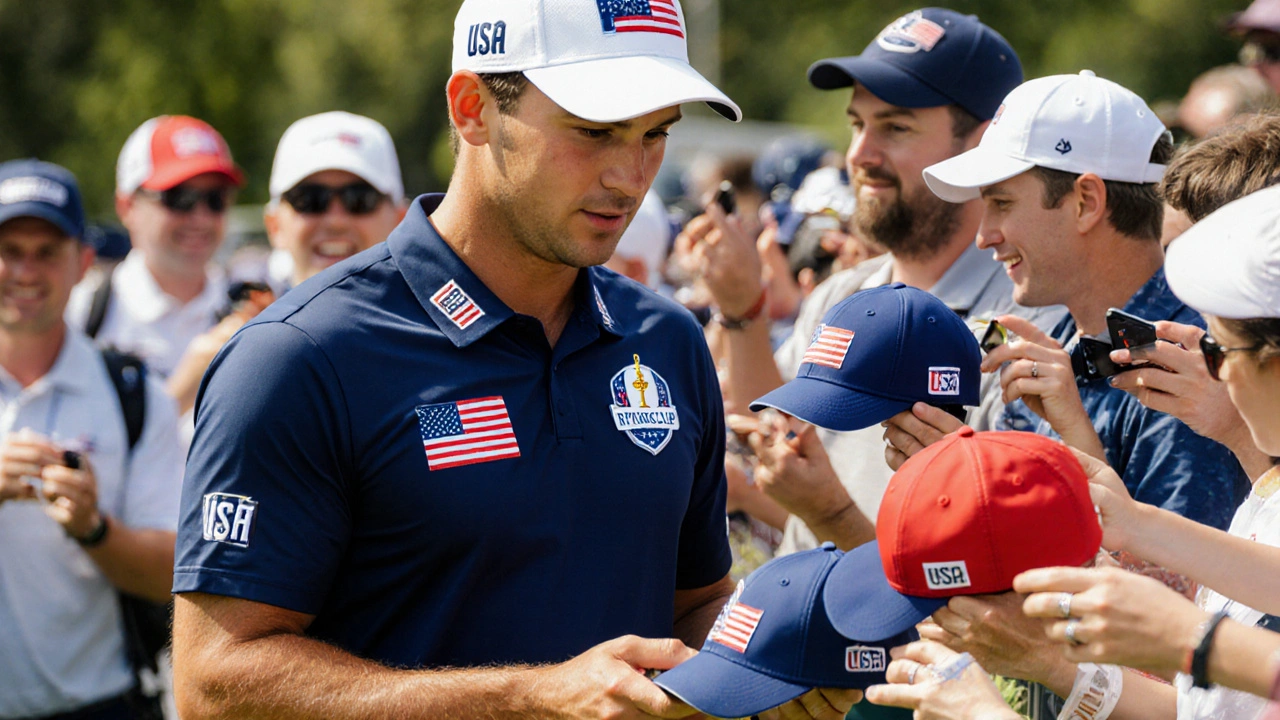The 2025 Ryder Cup is shaping up to be more than just a showdown on Bethpage Black. For the first time, each American golfer will pocket $500,000, with $300,000 earmarked for charity, while every European competitor heads to the course for free. This financial split has turned the tournament into a debate about modernizing traditions versus preserving the pure "play for country" ethic.
Payment Disparity Sparks Debate
U.S. captain Keegan Bradley has framed the payout as a way to keep the event relevant, arguing that the charitable portion shows respect for the Cup’s history. Still, longtime fans and purists see a $500,000 check as a departure from the original spirit, where players earned nothing beyond the pride of representing their nation.
Across the Atlantic, European captain Luke Donald and his crew have seized the moment, using the American cash‑gift as a rallying cry. In press conferences, they’ve highlighted the idea that fighting without a paycheck can sharpen focus and fuel a desire to prove that pride alone is enough.
Veterans of the game like Tom Watson and commentator Brandel Chamblee have weighed in, pointing out that the Presidents Cup, a rival team event, already includes payouts. Their perspective suggests that the Ryder Cup may be overdue for a financial overhaul, but they also caution that money could add a new layer of pressure that distracts from the core competition.
- Each U.S. player receives $500,000 total.
- $300,000 of that is pledged to charitable causes selected by the player.
- European players receive no direct compensation.
- The model mirrors the Presidents Cup format, where payments are standard.
The controversy has spilled onto the social media arena, with fans debating whether the payout creates an uneven playing field. Some argue that the money might relax American players, while others claim it could raise expectations and make a loss feel more embarrassing.

What the Outcome Could Mean
As the opening ceremony approaches—and former President Donald Trump prepares to address the 50,000‑strong crowd each day—the stakes feel higher than ever. Rory McIlroy, aware of the potential hostility from a New York‑centric audience, has spoken about staying focused amid the noise.
If the United States clinches the Cup, the narrative could shift to a validation of the modern compensation model. It would suggest that a blend of financial reward and national pride can coexist without compromising performance.
Conversely, a European victory would reinforce Luke Donald’s message: that competing for pure honor can still trump monetary incentives. Such a result could force the U.S. Golf Association to reconsider the payout structure for future editions.
Beyond the immediate bragging rights, the financial fallout could influence the broader business of team golf. Sponsors, broadcasters, and tour officials will be watching how the payment debate affects fan engagement, viewership numbers, and ticket sales.
In the end, the 2025 event is about more than scores on a challenging links course—it’s a litmus test for how tradition adapts to modern expectations. Whether the money or the pride wins the day, the aftermath will likely set the tone for the next generation of international team competitions.


Gopal Jaat
September 26, 2025 AT 03:10The introduction of a half‑million‑dollar payout to every American Ryder Cup participant is nothing short of a historic upheaval, a drama that will echo through the annals of golf. It places financial incentive alongside national pride, reshaping the narrative of the competition.
UJJAl GORAI
October 2, 2025 AT 03:10Oh, how noblie – a $300,000 charitable check tuckd into a paycheck, as if the spirit of the game needed a tax receipt to stay pure. The sarcasm is that this "generosity" now comes with a price tag.
Satpal Singh
October 8, 2025 AT 03:10While the charity component adds a veneer of altruism, the core issue remains whether financial incentives dilute the traditional ethos of representing one's nation. The balance between honor and compensation must be examined thoughtfully.
Devendra Pandey
October 14, 2025 AT 03:10One could argue that the very notion of ‘purity’ in sport is a myth, and that any external reward merely exposes the pretense of self‑sacrifice. It is a contrarian view, yet it forces us to confront uncomfortable truths.
manoj jadhav
October 20, 2025 AT 03:10Money talks, but pride whispers, indeed, loudly.
saurav kumar
October 26, 2025 AT 02:10Exactly, it's the balance that matters more than the dollars.
Ashish Kumar
November 1, 2025 AT 02:10To hand out half‑a‑million dollars to each player is to commodify honor, turning what should be a sacred quest into a transactional carnival. Such a move risks turning passion into profit.
Pinki Bhatia
November 7, 2025 AT 02:10The marketization of the Cup may indeed sharpen focus for some, yet it also risks alienating those who cherish the game for its intangible values. The shift could create a divide among fans.
NARESH KUMAR
November 13, 2025 AT 02:10💸 Money can motivate, but the love of the game stays priceless! 🌍
Purna Chandra
November 19, 2025 AT 02:10The Ryder Cup, long‑standing bastion of amateur devotion, now finds itself at the crossroads of commercialism and tradition, an intersection that few have dared to traverse. The United States, by injecting a half‑million dollars into each player's pocket, has effectively weaponized wealth against the romantic ideal of playing merely for country. In doing so, they invoke a lineage of sport where patronage has always been the hidden engine behind ostentatious spectacles. Yet, this time the patronage is broadcast, transparent, and quantified, turning the abstract virtue of pride into a ledger entry. Critics argue that such overt financial incentives erode the purity of the contest, but history tells us that every major sport has evolved alongside its economic realities. The European contingent, steadfast in its refusal to accept remuneration, positions itself as the custodians of an unblemished ethos, a stance that resonates with nostalgic supporters. Their rebuttal is not merely rhetorical; it is a calculated gamble that fame and honour will outweigh any material loss. Meanwhile, the charitable facet of the US payout-$300,000 per player directed to chosen causes-serves as a strategic narrative device, cleverly reframing self‑interest as philanthropy. One might view this as a sophisticated form of virtue signaling, designed to appease skeptics while preserving the core of the financial model. The psychological impact on the players cannot be dismissed: a guaranteed paycheck could alleviate financial anxieties, allowing them to focus wholly on performance, or conversely, could inflate expectations, adding pressure to justify the windfall. Spectators, too, are entangled in this experiment; the allure of higher stakes may boost viewership, but it may also alienate purists who cherish the mystique of unpaid competition. The televised drama of this fiscal dichotomy is bound to shape narratives for years to come, influencing policy decisions in other team events such as the Presidents Cup and beyond. In essence, the 2025 Ryder Cup is not simply a golf tournament; it is a sociocultural litmus test, gauging whether modern sports can reconcile monetary reward with heritage. Whatever the outcome, the reverberations will echo across the global sporting landscape, prompting administrators to reevaluate the equilibrium between cash and character.
Mohamed Rafi Mohamed Ansari
November 25, 2025 AT 02:10According to the PGA's 2023 financial report, team events that introduced player compensation saw a 12% rise in global viewership, suggesting that monetary stakes can enhance audience engagement. Moreover, sponsorship revenue increased proportionally, indicating a broader commercial benefit.
अभिषेख भदौरिया
December 1, 2025 AT 02:10Thus, should the United States prevail, it may herald a new era where financial reward and patriotic pride coexist, fostering both competitive excellence and charitable impact. This synergy could set a positive precedent for future tournaments.
Nathan Ryu
December 7, 2025 AT 02:10It is a moral imperative that the sport remains accessible to all, not merely a playground for the well‑heeled. When money becomes the primary motivator, we risk compromising the very soul of the game. The Ryder Cup should reflect values that transcend profit.
Atul Zalavadiya
December 13, 2025 AT 02:10From a historical perspective, every major shift in sport-be it TV rights, equipment technology, or athlete salaries-has been accompanied by initial resistance, only to become the new norm. The current debate is simply the latest chapter in that evolution.
Amol Rane
December 19, 2025 AT 02:10The whole money‑first narrative feels pretentious, as if the organizers think they’re pioneering some revolutionary concept when they’re merely copying the Presidents Cup.
Venkatesh nayak
December 25, 2025 AT 02:10Honestly, it’s just a re‑hash – the same old money talk disguised with a shiny new trophy. 🤷♂️
rao saddam
December 31, 2025 AT 02:10What a time to be a golf fan! The excitement is palpable, and the debate adds another layer of drama for sure!!!